Many chicken owners strive to provide their flock with a healthy, balanced diet to ensure optimal egg production and chicken health. While chickens love to dig into a variety of vegetables and fruits, some foods can be potentially harmful to them. A common question among poultry keepers is whether onions are safe for their chickens to consume.
Onions contain a compound called thiosulfate, which can be toxic to chickens if ingested in large amounts. This compound can cause a condition known as hemolytic anemia, wherein red blood cells are destroyed, thus impairing the bird’s ability to transport oxygen. This can lead to weakness, difficulty breathing, and even death in severe cases.

While it is generally advisable to avoid feeding chickens onions, a minimal amount of exposure is unlikely to cause harm. It is essential for owners to remain cautious and observe their birds closely for any signs of discomfort or illness following the ingestion of onions. Regular monitoring and a focus on providing a balanced diet will help maintain the overall health and well-being of a chicken flock.
Can Chickens Eat Onion – Is It Safe?
Chickens, as omnivorous creatures, can consume a wide range of food items. However, their diet should be closely monitored to ensure their overall health and well-being. One might wonder if onions, a common ingredient in many households, are safe for chickens to eat.
Onions contain a substance called thiosulfate, which can be harmful to chickens. When consumed in large amounts, thiosulfate can lead to a condition called Heinz body anemia. This condition negatively affects the bird’s red blood cells and can potentially be lethal. It is essential to weigh the risks of giving onions to chickens to avoid this potential hazard.
While the negative effects of onion consumption largely depend on the quantity eaten, it is also influenced by the chicken’s size and overall health. Some chickens may be more sensitive to the thiosulfate in onions than others. Hence, it can be challenging to determine a “safe” amount of onion to offer.
It is worth noting that chickens are typically drawn to strong flavors and aromas, so they might be tempted to consume onions if they have access to them. However, since the risks associated with onion consumption can outweigh any potential benefits, it is advisable to keep onions out of their reach.
Nonetheless, there are numerous alternatives to onions that can be offered to chickens as a part of a healthy diet. Fruits, vegetables, and grains are generally safe and beneficial, providing essential nutrients for the birds. For instance, leafy greens, berries, and seeds can make for excellent additions to a chicken’s diet.
While chickens might be tempted to eat onions, it is better to avoid feeding them this vegetable due to the possible health risks associated with thiosulfate content. By providing an array of safe and nutritious alternatives, you can ensure your chickens maintain a healthy and balanced diet.
Should Your Chickens Have It?
Chickens have a diverse diet, and they enjoy foraging for a variety of foods. However, it is crucial to consider the safety of any given food item before offering it to your chickens. In the case of onions, the answer is not clear-cut.
Onions contain a compound called N-propyl disulfide, which can cause Heinz body hemolytic anemia in poultry if consumed in large quantities. This condition leads to breaking down of red blood cells and oxygen-deprivation, which may ultimately be fatal for the bird. Therefore, feeding excessive onion to chickens can pose a threat to their health and well-being.
It is important to note that the occasional consumption of small amounts of onion is unlikely to cause any significant harm to chickens. They may nibble on onion peels or bits found in compost heaps or while free-ranging in your yard. These small amounts do not generally pose a problem and should not be a cause for concern.
To ensure the safety of your chickens, it is advisable to monitor their diet closely and avoid offering onions as a regular part of their meals. Focus on providing a well-balanced diet, including protein sources such as layer pellets, grains, vegetables, and fruits that are known to be safe for chickens.
Onions can be harmful to chickens if consumed in large quantities, occasional exposure to small amounts of onion is unlikely to cause significant harm. To safeguard your flock’s health, it is best to exercise caution and avoid intentionally feeding them onions as part of their daily diet.
What to Look Out for When Feeding Chickens Onions
Chickens can consume onions, but it is essential to monitor the amount they eat. Onions contain a compound called thiosulphate, which can cause Heinz body anemia if ingested in large quantities. This condition leads to weakened red blood cells and may result in respiratory distress or even death.
To ensure the safety of your chickens, feed them onions sparingly and observe their reaction. Some signs to watch for that may indicate health issues include:
- Lethargy
- Pale wattles and combs
- Loss of appetite
- Difficulty breathing
It is also crucial to provide a balanced diet for your chickens to maintain their overall health. The primary diet should consist of:
- Commercially formulated chicken feed for proper nutrition
- Fresh vegetables and fruits (avoid onions and other potentially harmful foods)
- Clean water supply
When feeding chickens onions, keep these tips in mind:
- Offer cooked or raw onions, but make sure they are chopped or grated into small pieces to prevent choking hazards.
- Gradually introduce onions to their diet, starting with a small amount, and monitor their reaction.
In general, it is safe for chickens to consume onions in moderation, but monitoring the quantity and observing their health is essential to prevent potential harm. Mind the signs mentioned earlier, maintain a balanced diet, and consult with a veterinarian if you suspect any health concerns related to onion consumption.
Can Chickens Eat Green Onions?
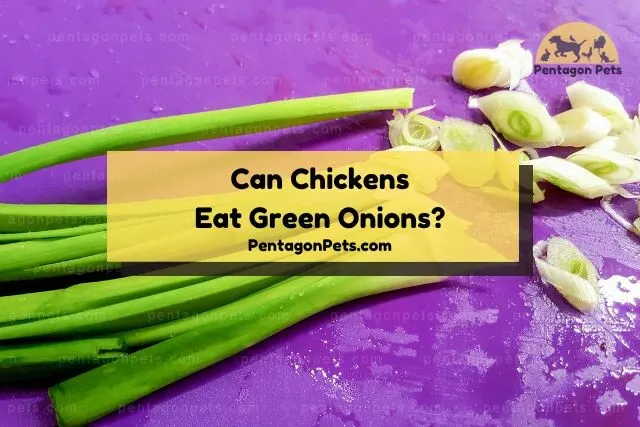
Chickens can consume green onions in moderation, but it is crucial to ensure that they are not overfed. Green onions contain small amounts of substances called thiosulphates, which can be toxic to chickens when consumed in large quantities. Nonetheless, a limited amount of green onions in their diet should not pose any harm.
When offering green onions to chickens, it is advisable to chop the green portions into small pieces for easier consumption. The bulbs should be avoided, as they have a higher concentration of thiosulphates. Introducing green onions gradually to the chickens’ diet will enable them to adapt, minimizing the risk of potential digestive issues.
It is essential to maintain a well-rounded and balanced diet for chickens to ensure their overall health and well-being. A nutritious diet should consist of high-quality poultry feed, fresh fruit, vegetables, and grains – as well as ample water supply. While green onions can be a source of vitamins A, C, and K, as well as some minerals and antioxidants, they should not serve as a primary food source. Instead, think of them as an occasional treat or supplement to their regular diet.
Chickens can safely consume green onions in moderation. However, do avoid overfeeding and ensure that their primarily diet consists of a well-rounded and balanced mixture of nutrients for optimal health.
Can Chickens Eat Onion Tops?
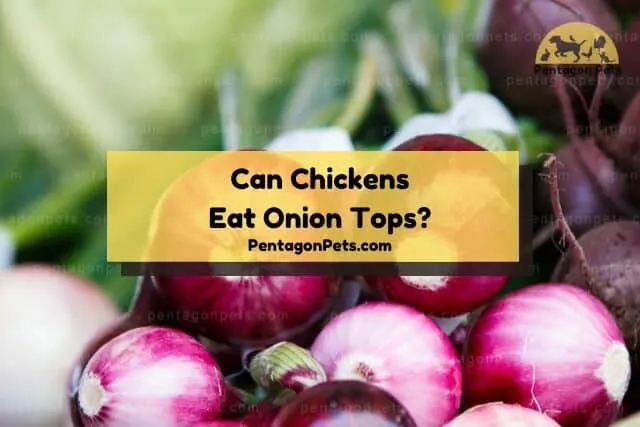
Chickens can be quite curious and may want to try various parts of plants, such as the onion tops. However, it is important to understand if eating onion tops is safe for chickens.
Onions, including the tops, contain a compound called thiosulphate. This compound is known to cause Heinz body anemia in animals, including chickens. Heinz body anemia leads to the destruction of red blood cells, resulting in fatigue, weakness, and difficulty in breathing.
Effects of Thiosulphate on Chickens:
- Heinz body anemia
- Reduced egg production
- Weakening of the immune system
- Gastrointestinal issues
So, feeding chickens onion tops in large quantities could lead to these adverse effects on their health. However, if a chicken consumes a small amount of onion tops by accident, it may not be a significant threat to their health. Chickens have a natural instinct to avoid harmful foods, so they are less likely to consume large amounts of onion tops on their own.
To keep your chickens safe and maintain their diet, it is recommended to avoid feeding them onion tops. Instead, provide them with a balanced diet that includes fruits, vegetables, and grains, which are healthier options for them to enjoy.
Can Chickens Eat Onion Leaves?
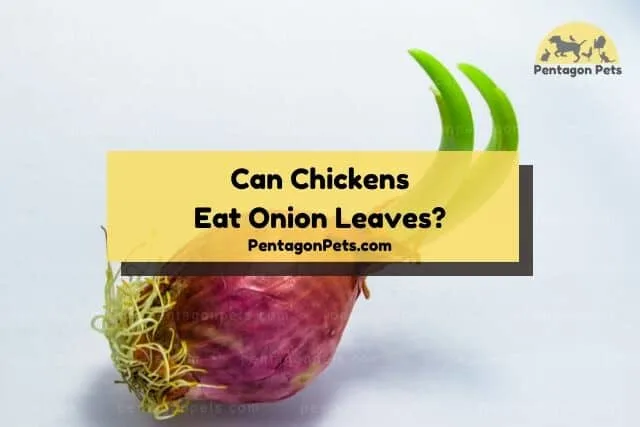
Chickens can be fed a variety of fruits, vegetables, and grains, but when it comes to onion leaves, caution is necessary. Onions, along with garlic and other plants in the Allium family, contain a substance called thiosulphate which can be toxic to chickens in large amounts.
While consuming a small amount of onion leaves is unlikely to cause serious harm to chickens, consistency and quantity matter. If chickens were to consume large amounts of onion leaves on a regular basis, it could lead to the formation of Heinz bodies in their red blood cells. Heinz bodies are small inclusions within red blood cells that damage the cell structure and reduce their ability to carry oxygen, potentially leading to anemia.
This article was first published on August 21, 2023 by Pentagon-Pets.
It is important to note that chickens may be attracted to the green and leafy appearance of onion leaves and could consume them if given the opportunity. However, as responsible chicken keepers, it is best to avoid feeding them onion leaves as part of their regular diet.
Instead, consider providing chickens with a variety of other safe and nutritious greens such as spinach, kale, and lettuce. These vegetables are not only free from toxic substances found in onion leaves, but they also possess essential vitamins and minerals that contribute to the overall health of your flock.
Although a small amount of onion leaves is not highly toxic to chickens, it is still best to avoid feeding them onion leaves to prevent any potential health issues. Offering alternative nutritious greens will ensure a healthy and happy flock.
Can Chickens Eat Onion Scraps?
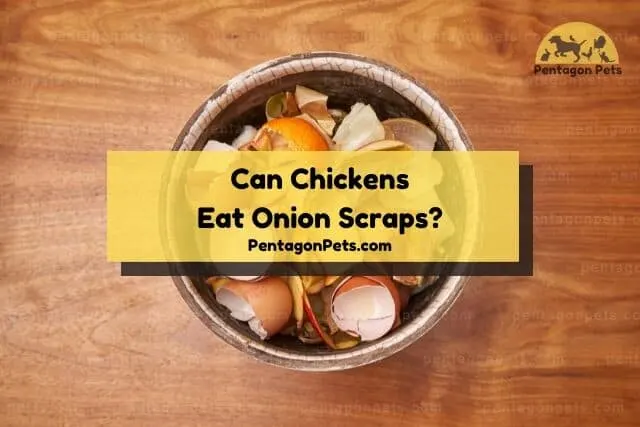
Chickens can eat a variety of food scraps, but when it comes to onion scraps, caution is advised. Onions contain a compound called N-propyl disulfide, which can be toxic to chickens if consumed in large quantities. This compound is known to cause Heinz body anemia, a condition where the red blood cells become damaged, ultimately affecting the chicken’s health.
While the occasional small piece of onion might not cause any immediate harm, regularly feeding chickens onion scraps is not recommended. Instead, consider providing them with other safe food scraps such as vegetables, fruits, and grains. Here are a few examples of safe scraps for chickens:
Pentagon Pet is the owner of this article that was first published on August 21, 2023.
- Leafy greens (spinach, lettuce, kale)
- Cooked rice and pasta
- Cooked beans and legumes
- Chopped fruits (apples, berries, bananas)
- Squash, pumpkin, and zucchini
It’s essential to ensure that these food scraps are fresh and free from any mold or spoilage. Spoiled food can lead to several health issues, including digestive problems and botulism, which can be lethal to chickens.
Onion scraps should not be a regular part of a chicken’s diet. Instead, focus on providing a nutritionally balanced diet consisting of quality chicken feed and safe food scraps to maintain their overall health and well-being.
Can Chickens Eat Onion Stalks?
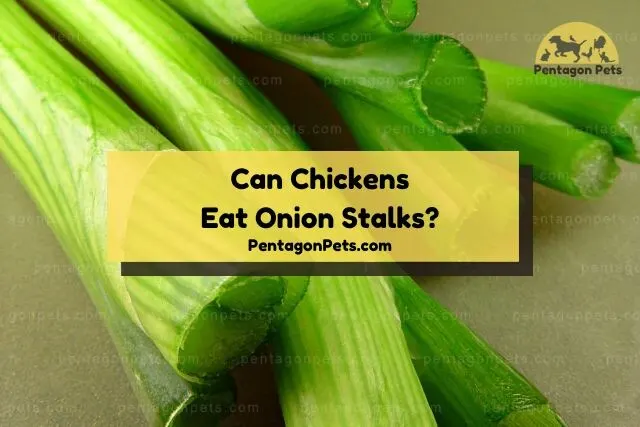
Chickens can technically consume onion stalks, but it is not the optimal choice for their diet. Onion stalks, like the onion bulbs, contain a compound called N-propyl disulfide. This substance can cause Heinz body anemia in chickens if consumed in large quantities. Heinz body anemia is a condition where the red blood cells become damaged, leading to a reduced ability for the blood to carry oxygen.
While small amounts of onion stalks are unlikely to cause harm, it is generally recommended to avoid feeding chickens any onion products. There are various other alternatives that contain essential nutrients and are safe for chickens to consume. For instance, leafy greens, vegetables, and fruits are all excellent options to include in a well-balanced diet for chickens.
It is important to remember that the primary source of nutrition for chickens should be a high-quality poultry feed. This ensures that they receive the proper nutrients and maintain optimal health. Supplementing their diet with occasional treats and leftovers should be done in moderation and with consideration given to the potential risks associated with certain foods, including onion stalks.
This article and its contents are owned by Pentagon Pets and was first published on August 21, 2023.
While chickens can physically consume onion stalks, it is not a recommended food due to the potential health risks. Chicken owners should opt for safer, more nutritious alternatives to maintain the wellbeing of their flock.
